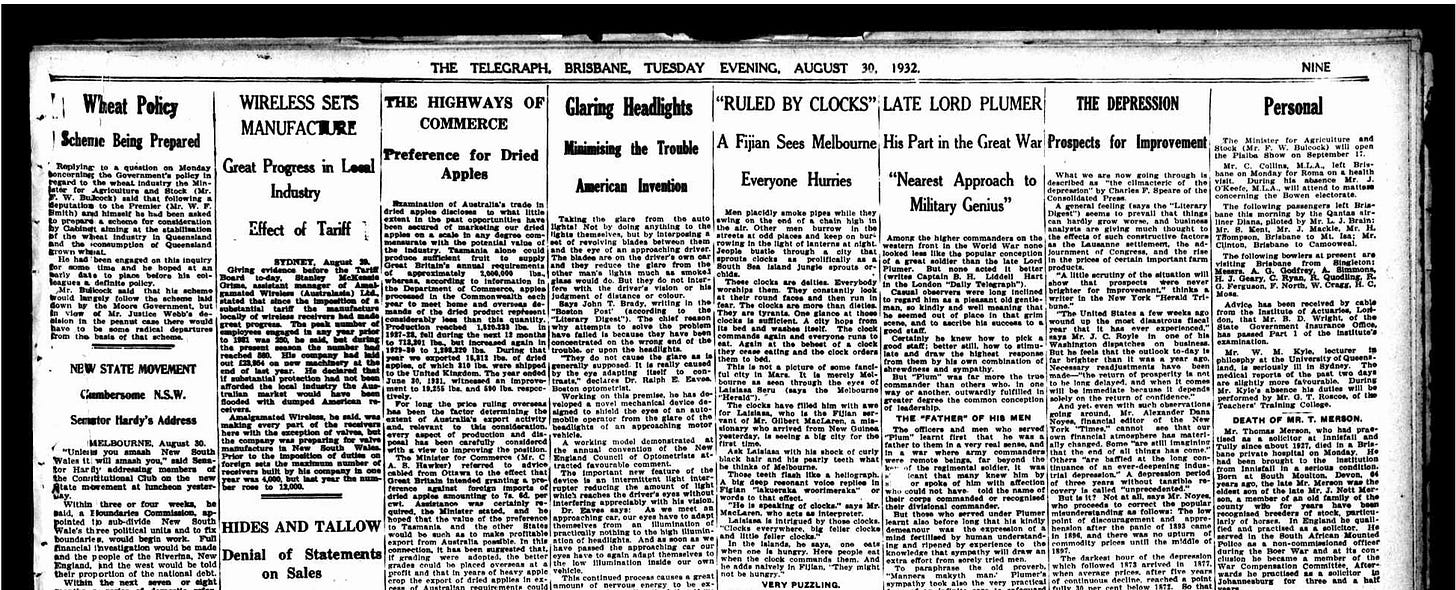Ruled By Clocks
What Happens When We Forget Time Was Once Ours
A Fijian man was interviewed by a journalist from Melbourne and he couldn’t wrap his head around the Western concept of a “clock.” He described clocks as gods or “deities,” stating:
“Everybody worships them… They constantly look at their round faces and then run in fear.”
“The clocks are more than deities. They are tyrants.”
I. The Clock as Deity, the Clock as Tyrant
“The clock commands… and everyone runs to eat. Again… they cease eating and the clock orders them to bed.”
This interview was published on the Telegraph in 1932 titled: “Ruled by Clocks,” and it serves as a commentary on the West’s relationship with freedom, time and productivity.
The clock is a god in this society, and it is a tyrant; it commands, it controls, and its power goes unquestioned.
We follow invisible rules and are terrified to displease the clock god. That fear comes in the form of being “late,” “lazy,” and “unproductive.”
The clock was not designed for joy, rest, or wellness. It was designed for productivity.
Before the clock, time was flexible, seasonal, and even personal.
As the Fijian man observed:
“In the Islands… one eats when one is hungry. Here, people eat when the clock commands them… [and] they might not be hungry!"
"If they wait until they become hungry, the clock might be giving different orders. It might be telling them to wash themselves or go to bed.”
“In the islands, people go to bed when they are tired. Here, the clock says go to bed and they might not be tired. What happens if they are not tired? They cannot disobey the clock."
II. Time, Disorder, and the Language of Deviance
We see firsthand, what the West does when we disobey the clock god. We label and diagnose people with mental illnesses such as ADHD and Autism.
The Mãori people have a word for ADHD, “aroreretini,” which means “attention goes to many things,” and their word for Autism, “takiwätanga,” means “in their or my own time and space.”
No disorder, no pathology, no judgement, just description. (Thanks Gabrielle Treanor).
The Western perspective asks, “How can we fix this person?" The Mãori asks, "How can we honour them as they are?"
In the West, clocks aren’t just tools. They’re moral authorities.
You’re not just “late,” “lazy,” “tired,” or “distracted” - you’re wrong. You’re a failure. And worst of all:
You’re a bad person.
But it’s ok! We can fix you. Just take this.
Eat this.
Drink this.
Do this.
Avoid this.
Replace this.
It’ll make you more productive and not lazy. Reliable, not flakey. Normal, not neurodivergent.
You’ll be a good person.
But none of these are absolute truths. Devon Price wrote a book about it called “Laziness Does Not Exist.” He calls BS on the moralization of energy. On tying worth to output. On seeing rest as weakness. If you’ve ever felt guilty for being tired, stop.
We live in a dehumanizing system that suppresses our intuition. We made a god out of the clock and a sin out of being human.
You’re not falling behind - you’re simply resisting something unnatural.
When the clock was invented, the factory bell replaced the sun, the wristwatch replaced intuition, and we, humans, became machines.
Time became a currency and a weapon for conformity and compliance.
III. Reclaiming Ancestral Time
This is all so puzzling to the Fijian man. He “has never seen so many clocks or slaves to clocks.” He stated:
“Although [clocks] stop… and start everything, they do not put out the lights or prevent people [from] working at night.”
“In New Guinea, when the sun sets, men rest. Here, they keep on pottering about building, driving trams, and digging in the street.”
He was witnessing a culture that amputated itself from its own nature. And his interview serves as a call to return to our cellular memory.
There are parts of us that remember how to feel things like hunger, sleepiness, grief, and pleasure. It remembers how to live by the moon, the season, the tides, by children’s laughter, aching hips, empty stomachs and the smell of rain.
This begs the question:
What if our “inability” to keep up is our body remembering another world? A world:
Where slowness wasn’t shameful.
Where rest wasn’t earned.
Where a full belly, a warm breeze, and good conversation were enough.
The problem isn’t that we don’t manage time well. It’s that we were never meant to manage it like this.
Slowing down, resting, and being inconsistent are natural. Our bodies are begging for this return.
We’ve been artificially making our way back through wellness apps, morning routines, calendar blocking, bullet journals.
It’s time to do it naturally. Stop hurrying. Stop trying to get ahead.
As the Fijian man exclaimed:
"And the people! There are too many and they walk too fast. Always rushing about, always in a hurry. What is behind it all? What is the motive for all this hurry? I think it is those clocks. People are afraid of the clocks.”
People are afraid of falling behind. We are misled to believe that following the clock means getting ahead, when the truth is:
The Fijian mean wasn't behind. He was free.
—
If you would like to read the full August 30, 1932 article from The Telegraph, DM me on Instagram (boozylectures).
Credit to aishamarienoelle on TikTok for bringing this article to my attention!





I agree completely with this article - we are trapped by the clocks. The only thing I'd like to ask... Perhaps a more tricky question is how do we actually free ourselves and not care about time when it's so tied to everything else?
I go to school for 8 hours a day, and quite literally law forces me to move from period to period even if I get in a creative flow in 1st period and want to keep creating art, I need to leave else I be marked absent.
Also, time is actually important if we want to organize events where a lot of people are meeting at once. It's a different world here in the US - people live in different places, and meetings must usually be planned. We can't just forget about time and stop by at all our friends' houses, spontaneously asking if they want to go for dinner. I wish we could, but we can't.
So what forms of resistance can we transition to? Maybe taking off our watches or hiding the time on our phones and laptops. When we get home after our 8 hours under the time tyrant maybe we just let ourselves forget about it. Cut our losses and sieze what we can. What do you think?
This article puts into perceptive scientists’ reluctance to accept that bees have an endogenous clock.
In the early 20th century, a scientist put sugar water outside of a bee's hive every day at 4pm. Soon enough, the bees learned to leave the hive every day at 4pm, even when there was no sugar water, suggesting bees can measure and perceive time.
This conclusion was met with criticism as skeptics argued that the bees weren't perceiving time, and were measuring the angle of the sun. So they re-did the experiment in the dark, and still the bees came out at 4pm. Even then, skeptics weren't satisfied, and suggested the bees were measuring the heat of the sun instead.
And so scientists recreated the experiment underground in a salt mine. When the bees once again came out at 4pm, many argued that the bees were measuring the rotation of the Earth instead (which is a far more advanced and impressive ability???)
Later on, a scientist conducted the experiment in Paris, and then flew the bees to New York City, where they left the hive at 10 in the morning, because they experienced jet lag, finally settling the debate that bees can perceive time.
As humans ruled by clocks, we resist the idea that bees can tell time because this reveals their disregard for our tyrant altogether. We cling to the belief that intelligence is ours alone, and that our inventions chart a noble ascent toward some pinnacle of existence. Because if bees don’t need our gods, then we are forced to question who our gods are and if we were ever gods. This also challenges our innovative trajectory and our place “above nature”.